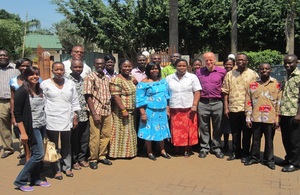DFID Research: Informed national decision making requires transparent global guidelines
A new report in PLOS Medicine documents the experience of the Ghana National Drugs Programme

All participants who attended the meeting plus both of the Liverpool facilitators. Picture: Dave Sinclair and Sukrti Nagpal
Policy groups need transparent information on the evidence supporting global recommendations on paediatric medicines. This is the conclusion of authors of a recent report from the Essential Medicines Programme in Ghana, describing their work examining which new drugs recommended by the World Health Organisation (WHO) they might include in their national drug lists.
The report, published in PLOS Medicine, documents the experience of the Ghana National Drugs Programme working with David Sinclair and Paul Garner of the Evidence Building and Synthesis Research Consortium. The team reviewed the international evidence base for five priority paediatric medicines in order to decide whether or not to include them in Ghana’s essential drug list.
The drugs considered by the committee were:
- Oral zinc sulphate for acute diarrhoea
- Injectable artesunate for severe malaria
- Topical chlorhexidine for preventing neonatal cord sepsis
- Dispersible oral amoxicillin for community acquired pneumonia
- Oral and injectable caffeine citrate for neonatal apnoea
According to the authors, applying the global recommendations to Ghana was not straightforward for any of the five medicines, despite high quality evidence of important clinical benefits, because of the unproven effect of the drugs in African settings and the scant information on cost effectiveness and the supply chain.
After the authors did their own review of the evidence on the effectiveness of these drugs in the Ghanaian context, they decided to include only four out of the five drugs in the national drug list.
This project demonstrates why global recommendations should be presented alongside transparent descriptions of the evidence base, allowing policy groups to identify where, when, and how the interventions have been evaluated, and any factors limiting wider applicability.
The authors argue for implementation guidance to help cost analyses at country level.
In addition, for interventions where feasibility and affordability are likely to vary from setting to setting, the [World Health Organization] could further assist national decision-makers by providing implementation guidance on the assessment of health system implications, training and education requirements, and country level cost analyses.
The report concludes with strong recommendations for cross country collaboration.
As many policy questions are relevant across sub-Saharan Africa, and policy makers are likely to encounter recurrent problems, we encourage regional collaboration on health technology assessment, and sharing of information and resources.
The UK Department for International Development funds the Effective Healthcare Research Consortium which aims to increase evidence-informed health sector decisions in low- and middle-income countries (LMIC).